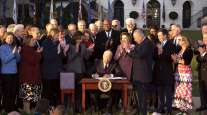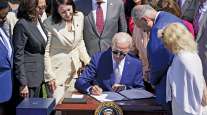Senior Reporter
‘Pivotal Moment’ for Infrastructure, Says an Optimistic Nancy Pelosi

WASHINGTON — U.S. House Speaker Nancy Pelosi told road construction industry executives she is optimistic about the prospects of advancing a comprehensive infrastructure package during the 116th Congress.
“This is really a pivotal moment for all of us in this room, for our country,” Pelosi said on May 14, addressing the Transportation Construction Coalition during an Infrastructure Week advocacy forum. “We just have to stick with the program.”
Although she did not specify when a comprehensive infrastructure package would advance through Congress and reach the president’s desk, she told the coalition, “I’m confident that it will happen.”
Speaker Pelosi tells @ARTBA she’s optimistic about the prospects of securing a funding deal for an infrastructure package #BuildForTomorrow pic.twitter.com/6EaewFc968
— Eugene Mulero (@eugenemulero) May 14, 2019
A robust, long-term infrastructure measure would be helpful in improving freight connectivity, assisting transit systems, addressing certain security concerns and advancing severe-weather resilient construction projects, Pelosi (D-Calif.) explained. Such provisions, she added, would potentially lead to new construction jobs around the country.
Alongside leaders from her caucus, Pelosi is expected to meet with top Republicans and President Donald Trump as early as this week to discuss infrastructure policy.
Pelosi emphasized she will wait to hear from Trump on how he intends to fund a $2 trillion infrastructure package. The package’s top line was reached during a White House meeting on April 30 between Democratic leaders and Trump.
The measure, the Democrats explained, would focus on surface transportation, such as roads, bridges and tunnels. It also would include provisions related to expanding broadband access. The thorny matter of funding the package was not resolved at that initial encounter.
Pelosi’s optimism on infrastructure policy was echoed by key transportation policymakers who spoke at the same event. Sen. Tom Carper (D-Del.), ranking member on the surface transportation panel, indicated a bipartisan agreement on funding would need the president’s support. The senator also acknowledged passing an infrastructure package would necessitate direct federal funds instead of a reliance on the private sector.

Carper
“If we’re going to have something as robust as $2 trillion, it has to be substantial,” Carper said. “I don’t expect him to be out there all by himself fighting for $2 trillion. If it’s reasonable, hopefully we’ll have the opportunity to help craft a package in the end, but [Trump] needs to show leadership.”
Carper is among the few transportation leaders on Capitol Hill supportive of higher fuel taxes for highway programs. Trump, he said, privately endorsed increasing such taxes during a meeting with lawmakers last year. White House officials have not denied Carper’s claim.
Last year, the White House unveiled a 10-year, $1.5 trillion plan to largely be funded by the private sector that the GOP-led Congress disregarded.
Meanwhile, top Republicans on the transportation committees have been dismissive about higher fuel taxes to help fund transportation. They instead point to alternatives, such as charging motorists a fee for the miles they travel, as well as approving public-private partnerships.
Rep. Abby Finkenauer (D-Iowa), vice chairwoman of the Highways and Transit Subcommittee, emphasized potential economic benefits that would result from approving a comprehensive infrastructure measure.

Finkenauer
“Folks know that the dollars that we spend on infrastructure are some of the best return on investments we have in this country,” the congresswoman said at the event.
The Transportation Construction Coalition, co-chaired by the American Road and Transportation Builders Association, and other major stakeholders support higher federal fuel taxes to ensure the long-term solvency of the Highway Trust Fund. The account, which assists states with construction and maintenance, relies on dwindling revenue from the 18.4 cents-per-gallon gas tax and the 24.4 cents-per-gallon diesel tax. The rate has not been raised since 1993.
Citing federal inaction on long-term infrastructure funding, more than two-thirds of the states have approved higher fuel taxes in recent years.




